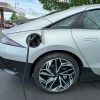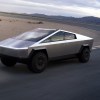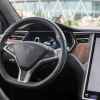
Lexus May Show Production Version of LF-SA Concept At 2019 Tokyo Motor Show
We have expected that the first Lexus all-electric car would be developed around being a Tesla Model S beater. Now, we’re hearing otherwise from Autocar.
Lexus may be building a small city car. It will debut at the 2019 Tokyo Motor Show in October. They say it’s a “city-friendly” all-electric hatchback, loosely based on their 2015 LF-SA concept car. Lexus chief engineer Koji Sato says the concept it is bringing to the show could be a preview for a production model.

Being this is the second all-electric city car Lexus has shown, it must be pushing this idea internally, and it makes sense. Until Toyota creates a completely new all-electric platform Lexus will mostly be electrifying existing models. Why not create something that stands out and it can make more cheaply, and also be able to amortize the electric development costs over more production units?
All Lexus EV By 2025
Lexus has already said it will electrify all of its internal combustion models by 2025, but there probably won’t be anything that differentiates their style and look from the cars they’re derived from. They know that part of the appeal of the Prius when in its first years and also the i3 is they are instantly recognizable and unique.

In the recent past rumors have swirled that Lexus might target the BMW i3 all-electric sedan rather than going after Tesla when it finally goes with an all-electric model. Remember that the i3 is the world’s best-selling premium compact all-electric vehicle.
BMW first introduced the i3 in 2014 and its numbers have risen steadily. It sold almost 10,000 i3s in the first quarter of 2019, a 16.2% increase. BMW has seen sales rise steadily over the life of the i3 to this point.
Over the years Toyota has been putting its zero-emissions efforts toward hydrogen-power, lagging behind in electricity. But hydrogen infrastructure has been slow to develop, hampering popularity, so Toyota is ramping up electric development to be a leader in EV manufacturing.
Solid-State Battery Development
To lead means that Toyota will have to bring something to the all-electric-vehicle table. Rather than using lithium-ion batteries like the other manufacturers, Toyota is developing the use of solid-state batteries for production.
Chinese emissions standards are getting more restrictive which is another reason Toyota needs electric vehicles now. It needs more zero-emissions cars to meet the corporate average standards in China. Both BMW and Volkswagen have shown interest in solid-state battery technology by investing in startup companies working on this application.
Besides solid-state batteries, Sato says Toyota is looking at in-wheel electric motors, too.
In-Wheel Motor Development
The advantage of in-wheel technology is that the regenerative power which comes from braking puts the power directly to the motor almost instantly. This increases the motor’s efficiency because it reduces the distance the power must travel. But Sato also says that it will take years for this technology to make it to production at Lexus.
The Tokyo Motor Show is slated to be a whirlwind of concept and new-car releases when it starts the last week of October. Stick around because Motorbiscuit.com will have it all for you.




